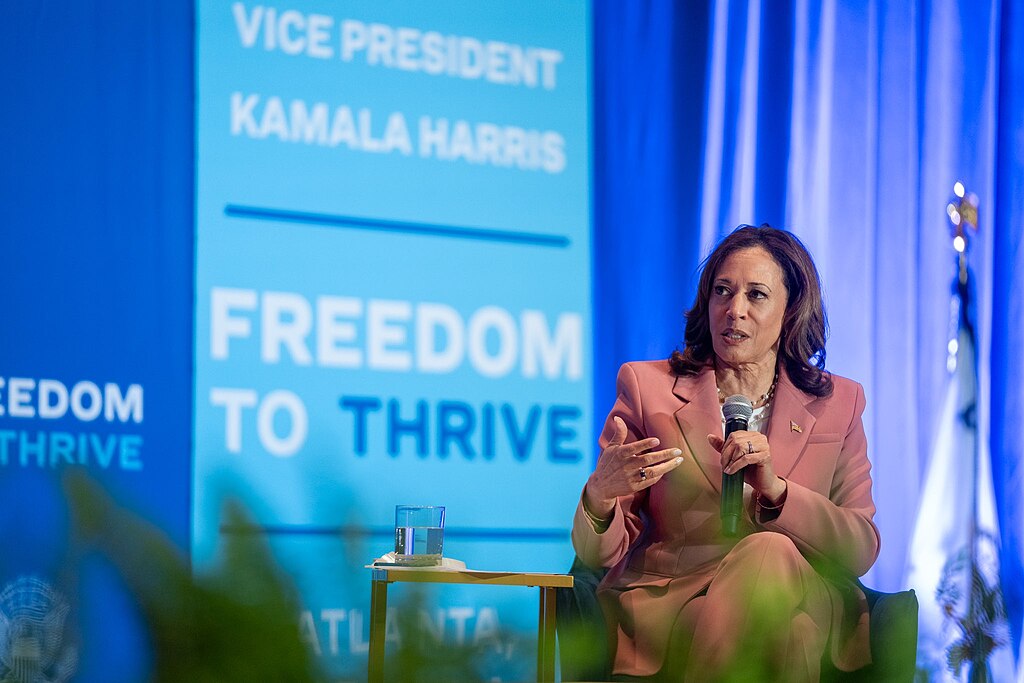Vice President Kamala Harris confronted former President Donald Trump over his perceived alliances with authoritarian figures, accusing him of courting dictator support. Harris’s sharp remarks underscored the ongoing narrative that Trump, throughout his political career, has maintained unusually close relationships with several autocratic leaders, particularly Russian President Vladimir Putin.
The confrontation reached a critical point when Trump responded by pointing out that Putin had previously endorsed Harris’s candidacy. His retort came as a direct challenge to her accusations, flipping the narrative and suggesting that her political alignment with foreign powers had its own complications. The exchange quickly became a flashpoint in the debate, fueling discussions about both candidates' international relationships and the broader implications for U.S. foreign policy.
Harris’s critique of Trump echoed a central theme in Democratic messaging since his rise to political power: that his leadership style and relationships with authoritarian figures like Putin, North Korean leader Kim Jong-un, and others signaled a dangerous erosion of democratic norms. Harris sought to paint Trump as someone who undermines American values by aligning with leaders who seek to challenge global stability.
For Trump, the accusation was nothing new. Throughout his presidency, he repeatedly faced scrutiny for his rapport with figures such as Putin, which critics labeled as too accommodating and deferential. However, his decision to turn the tables on Harris by referencing Putin’s public statements regarding her candidacy introduced a new layer of complexity to the debate.
Putin, during previous international engagements, had made comments that could be interpreted as support for Harris, particularly as tensions between Russia and the United States escalated. Trump’s response aimed to capitalize on these remarks, suggesting that Harris too had been singled out by the Russian leader as a potentially favorable political figure.
This exchange is likely to fuel further discussion about the candidates' relationships with foreign leaders as the 2024 presidential election approaches. Both Harris and Trump are positioning themselves as leaders capable of restoring or maintaining American strength on the global stage, but their approaches could not be more different. Harris, representing the current administration, has stressed multilateral cooperation and rebuilding alliances that were strained during the Trump presidency. Trump, by contrast, continues to emphasize his unique style of diplomacy, which he argues was effective in de-escalating global tensions during his time in office.
The debate moment also underscores the broader issue of foreign interference in U.S. elections, a theme that has plagued American politics since the 2016 election, when Russia’s meddling in favor of Trump became a central issue. Harris’s critique and Trump’s rebuttal both tap into voter concerns about the integrity of U.S. democracy and the influence of foreign powers in shaping its direction.
As the debate rages on, the clash between Harris and Trump over their connections to authoritarian figures is likely to be a focal point in the election narrative. With both candidates vying for leadership in a world increasingly defined by geopolitical uncertainty, their ability to address these criticisms and articulate a clear vision for U.S. foreign policy will be critical in shaping voter perceptions heading into 2024. The fallout from the debate exchange is sure to dominate the news cycle, keeping foreign influence and national security at the forefront of the electoral conversation.



 Melania Trump to Chair UN Security Council Meeting as U.S. Assumes Presidency
Melania Trump to Chair UN Security Council Meeting as U.S. Assumes Presidency  Federal Judge Blocks Virginia Social Media Age Verification Law Over First Amendment Concerns
Federal Judge Blocks Virginia Social Media Age Verification Law Over First Amendment Concerns  U.S.-Iran Nuclear Talks Show Progress but No Breakthrough Amid Rising Military Tensions
U.S.-Iran Nuclear Talks Show Progress but No Breakthrough Amid Rising Military Tensions  ICE Hiring Surge Raises Vetting Concerns Amid Rapid Expansion
ICE Hiring Surge Raises Vetting Concerns Amid Rapid Expansion  Netanyahu Suggests Iran’s Supreme Leader Khamenei May Have Been Killed in Israeli-U.S. Strikes
Netanyahu Suggests Iran’s Supreme Leader Khamenei May Have Been Killed in Israeli-U.S. Strikes  Germany and China Reaffirm Open Trade and Strategic Partnership in Landmark Beijing Visit
Germany and China Reaffirm Open Trade and Strategic Partnership in Landmark Beijing Visit  Trump Launches Operation Epic Fury: U.S. Strikes on Iran Mark High-Risk Shift in Middle East
Trump Launches Operation Epic Fury: U.S. Strikes on Iran Mark High-Risk Shift in Middle East  Russia Signals Openness to U.S. Security Guarantees for Ukraine at Geneva Peace Talks
Russia Signals Openness to U.S. Security Guarantees for Ukraine at Geneva Peace Talks  Dominican Republic Unveils Massive Rare Earth Deposits to Boost High-Tech and Energy Sectors
Dominican Republic Unveils Massive Rare Earth Deposits to Boost High-Tech and Energy Sectors  Trump Floats “Friendly Takeover” of Cuba as Rubio Reportedly Engages in Talks
Trump Floats “Friendly Takeover” of Cuba as Rubio Reportedly Engages in Talks  Venezuela Oil Exports to Reach $2 Billion Under U.S.-Led Supply Agreement
Venezuela Oil Exports to Reach $2 Billion Under U.S.-Led Supply Agreement  Trump Media Weighs Truth Social Spin-Off Amid $6B Fusion Energy Pivot
Trump Media Weighs Truth Social Spin-Off Amid $6B Fusion Energy Pivot  Trump Floats Ted Cruz for Future U.S. Supreme Court Nomination
Trump Floats Ted Cruz for Future U.S. Supreme Court Nomination  Trump Orders Federal Agencies to Halt Use of Anthropic AI Technology
Trump Orders Federal Agencies to Halt Use of Anthropic AI Technology  Pentagon to Halt Ivy League Programs for U.S. Military Officers Starting 2026
Pentagon to Halt Ivy League Programs for U.S. Military Officers Starting 2026  USITC to Review Impact of Revoking China’s PNTR Status, Potentially Raising Tariffs on Chinese Imports
USITC to Review Impact of Revoking China’s PNTR Status, Potentially Raising Tariffs on Chinese Imports  Trump to Address Nation as U.S. Launches Strikes in Iran, Axios Reports
Trump to Address Nation as U.S. Launches Strikes in Iran, Axios Reports 































